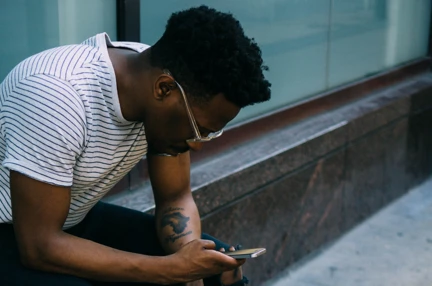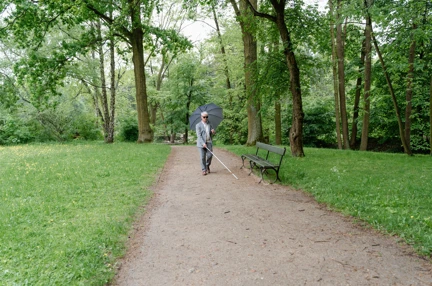Sight loss-friendly holidays
Sun, sand and sangria… Most people love the idea of jetting off on a summer holiday. But for those living with sight loss, getting away can often feel more stressful than relaxing.
Luckily, help is at hand. These days you can book accessible, supportive holidays designed specifically with your needs in mind.
Read on to find out more - and for tips to help you prepare and pack so you get the relaxing break you deserve.
Specialist holidays
Traveleyes
Travel operator offering group global destinations and experiences designed for vision impaired and fully sighted people travelling together. Traveleyes welcomes holidaymakers travelling solo, as a couple or with friends, and take groups to all kinds of wonderful places, from the Peak District to Peru.
Traveleyes says: "As a blind traveller, you’re able to book a holiday with the same freedom and independence that sighted people have always enjoyed. What’s more, you don’t have to bring anyone with you, as you will be joining a group of like-minded explorers."
Seable
Award-winning social enterprise providing accessible, tailored and group holidays for the vision impaired community. Seable sets out to craft your perfect holiday and look after you through a 24-hour emergency helpline and local chaperones.
Seable says: "As a VI traveller, you simply pick a date, a destination, or a group offer and we will take care of the rest. We will listen to your ideas, recommend the best experiences and ways to explore, and will take all the hard work out of planning an incredible holiday."
Responsible Travel
Eco-friendly travel operator providing a wide range of accessible holidays and tours, from cruises to safaris to family activity breaks. They also have a large range of holiday guides with year-round weather charts, travel advice and things to do.
Responsible Travel says: "Whether you need wheelchair accessible vehicles, a sighted travelling companion or a peaceful hotel that can accommodate a cognitive condition, our holidays benefit local communities, and help to protect nature."
Limitless Travel
Founded by and for disabled travellers, Limitless Travel pride themselves on understanding how much planning and worry can go into getting away. Their wide range of holidays, include cruises and coach trips, and they offer fully accessible transport, carefully selected accommodation and balanced itineraries.
Limitless Travel says: "With professional carers on every trip, meticulous planning of itineraries, and comprehensive accessibility, we take care of everything so you can enjoy a holiday with peace of mind."
RNIB
Sight loss charity RNIB, which provides information and advice for people with sight loss, has a useful Sightline Directory of specialist hotels.
RNIB says: "A 'specialist' hotel has staff specifically trained to offer support to people with sight loss. The hotels often have additional features such as colour contrasting surfaces, talking lifts, tactile signs, talking menus and useful products such as liquid level indicators and talking alarm clocks."
Blind Veterans UK
We offer our beneficiaries and their carers a fantastic range of breaks all year round at our fully accessible beachfront centre on the south coast in Rustington. From walking to archery; art to golf, our subsidised activities cater to all ages, abilities and levels of sight loss.
We say: "We welcome Blind Veterans UK beneficiaries and their partners or carers to our home from home in Rustington. Just a stone’s throw from the beach and short stroll from the delightful high street, our centre has it all - including experienced, caring staff who will help make sure your stay truly one to remember."
How to prepare
As tempting as it can be to just pack your bags and jet off, the more prepared you are, the better - and the following tips can make all the difference:
Contact your accommodation and transport providers in advance and be completely open and honest about your accessibility needs so they can support you and assist you when you arrive if needed.
Have all documents and information to hand or in your phone, including emergency contacts just in case you get lost (and don't forget your phone charger - with an adaptor if you're travelling abroad).
If you use a Smart phone, you could try out a few sight loss apps before you go such as Seeing AI and Be My Eyes to see if you find them useful, plus magnification, Google maps and language translation.
The more planning you do beforehand, the better your break will be. Plan your day trips and routes and book assisted travel if required so that you don't miss out on the tourist attractions you really want to visit.
Lots of holiday destinations offer guided walking, bus or boat tours which can be so much easier and more relaxing than trying to find your own way around - plus more interesting. You may be able to book these before you go.
If you’re getting a flight, stick something bright on your luggage to make it easier to identify at the airport. You could also ask your travel companion to wear something bright so they stand out in the crowd.
Hotels and other accommodation should ask you to complete a Personal Evacuation Plan (PEP) before or when you arrive. This is a customised plan for people who may need help evacuating due to disabilities or impairments.
What to pack
For people with sight loss, it can be a challenge to manage day-to-day life in unfamiliar territory. Here are some things to take with you that can help:
Take a spare cane in case one gets lost or broken, and whatever other specialist aids you rely on. You might also want a torch for dimly lit spaces.
Take a small cross-body bag for essential items like money, keys, documents and phone, and always keep it on you when you’re out and about.
If you’re staying in a hotel or self-catering accommodation, a liquid level indicator can help prevent spills and burns when you make your cuppa.
A talking alarm clock is an essential for many of our veterans, particularly if they're likely to be jetlagged. Some accessible hotels may provide these.
It can be useful to take a few brightly coloured ties to wrap around door handles and bed posts to help you navigate your way around your room.
Bluetooth key trackers help you find your keys or other items by beeping. You could even use one to help locate the bathroom, especially at night.
Bumpons are little tactile markers you stick on objects to help identify them, such as a shampoo bottle or a button of the safe in your hotel room.
A solid sunscreen stick is much less messy and easier to apply than cream from a bottle, and a hat and light clothing is a must for covering up in the sun.
Worth remembering
Wherever you choose to stay, the most important thing is to let them know beforehand that you may need extra support getting there and finding your way around.
According to the Equality Act 2010, a hotel can’t refuse to serve you for a reason related to your disability and you should be able to expect the same level of service as everyone else.
Based on the experiences of our veterans, we can safely say that most places will be more than happy to accommodate your needs.
Disclaimer
Please note, the external organisations listed above are for your information only. Their inclusion doesn't necessarily imply a recommendation or endorsement.
Read more about sight loss
Footcare for people with sight loss
3 Jun 2025
Our rehabilitation officers share their tips and tricks to help you look after your feet.

Seeing text more clearly on a screen
19 Oct 2023
Enhancing your screen reading experience across different devices, from computers to mobile phones.

Using tech to navigate the streets
8 Jan 2024
These days most smartphones have built-in apps to help you plan routes and give real-time information.
